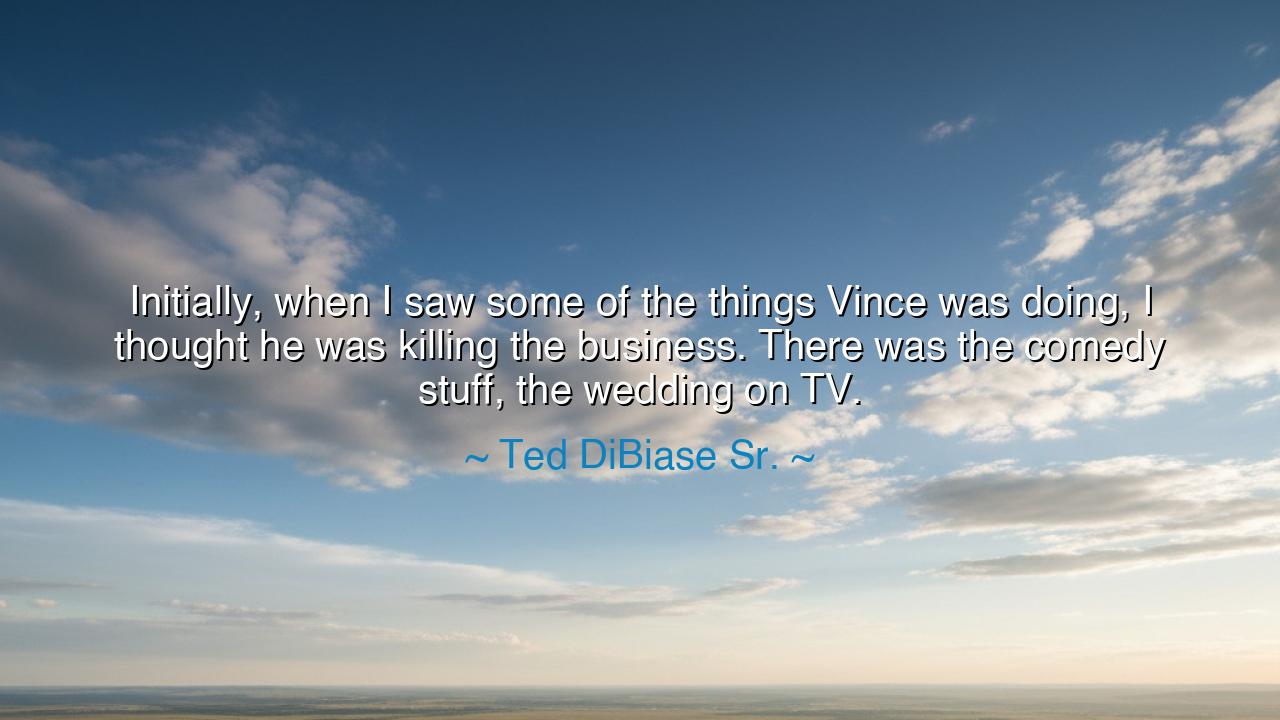
Initially, when I saw some of the things Vince was doing, I
Initially, when I saw some of the things Vince was doing, I thought he was killing the business. There was the comedy stuff, the wedding on TV.






Ted DiBiase Sr., with the candor of a warrior who had given his life to his craft, declared: “Initially, when I saw some of the things Vince was doing, I thought he was killing the business. There was the comedy stuff, the wedding on TV.” In these words, he gives voice to the struggle between tradition and transformation — the fear that what once was sacred and strong might be cheapened by spectacle and laughter. For the business of wrestling, like all arts, rests on the fragile balance between honor and entertainment.
The ancients, too, wrestled with this dilemma. In the theaters of Greece, where tragedies of Aeschylus and Sophocles once lifted men to awe, the arrival of comedy unsettled many who thought it diminished the solemnity of the stage. Yet Aristophanes’ humor endured, showing that even the sacred can make room for jest. DiBiase’s unease at the comedy and the televised wedding echoes this timeless tension — the clash between preserving dignity and embracing change.
History offers us the story of the gladiatorial games in Rome. At first they were solemn rituals, tributes to the dead, but as time passed they transformed into vast spectacles, with beasts, mock battles, and theatrical elements. Many cried that the essence of the games was being lost, that the business of honor was being traded for mere spectacle. Yet, like the weddings staged on television, these changes drew greater crowds, altering the art forever.
DiBiase’s words are also a reminder that those who guard tradition often see innovation first as threat. The wedding on TV, to him, seemed frivolous, a betrayal of the seriousness of the ring. Yet to others it was a new path, expanding the story and drawing new hearts into the drama. What one generation calls “killing the business” may be remembered by another as its rebirth.
Let the generations remember: all traditions face the storm of change. Some will resist, clinging to the old ways with devotion; others will embrace novelty, weaving humor and spectacle into the fabric of the sacred. As Ted DiBiase Sr. teaches through his reflection, greatness lies not only in honoring the past but in discerning when change destroys and when it breathes new life. For even a wedding on TV, once mocked, may become a milestone in the saga of an art reborn.






GDGold D.dragon
Ted DiBiase’s initial reaction to Vince McMahon’s decisions shows how hard it can be to see the bigger picture when you’re in the midst of it. At first glance, it seemed like Vince was veering off course, but in hindsight, his creative decisions like the comedy segments and wedding on TV helped reshape the industry. Do you think risk-taking in business is often misunderstood, or is it usually clear from the start whether it will pay off?
DDang
I love that Ted DiBiase Sr. is so candid about his initial skepticism towards Vince McMahon’s ideas. It’s interesting how Vince was willing to take risks that others in the industry might have seen as harmful. Do you think wrestling would have evolved in the same way if Vince hadn’t introduced these unconventional elements? Was it necessary for the business to push boundaries in such unexpected ways, like integrating weddings and comedy into the matches?
TMthành min
This quote made me think about how sometimes drastic changes can be misinterpreted as mistakes at first. Vince McMahon’s approach to integrating comedy and spectacle into wrestling was groundbreaking, but at the time, it might’ve seemed like a risky move. Do you think Ted DiBiase’s concerns were valid in the context of that era, or was Vince simply adapting to a changing entertainment landscape? Could wrestling have survived without these bold moves?
NTThan Thi Ngoc Thuy
Ted DiBiase Sr.'s comment about Vince McMahon’s early moves in the business is quite revealing. It shows how some changes or risks can be seen as a threat to the core of a business, especially when the traditional methods are so entrenched. Do you think Vince was ahead of his time, revolutionizing the industry, or do you agree with Ted that some of his decisions, like the comedy skits and wedding on TV, were too much for the audience to handle?